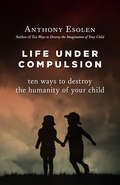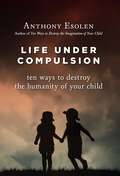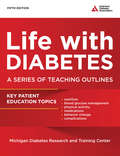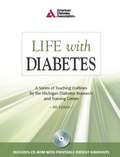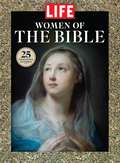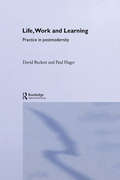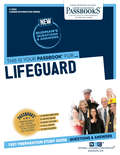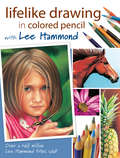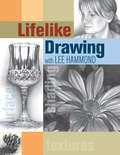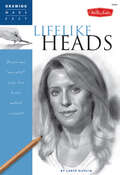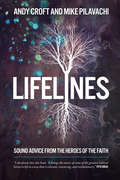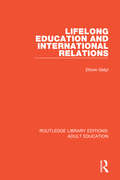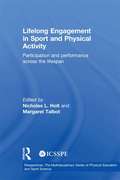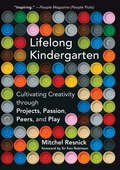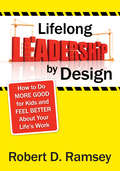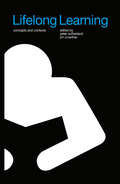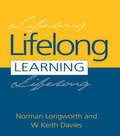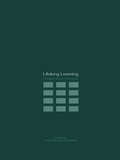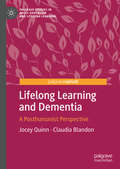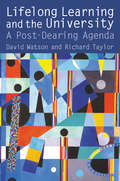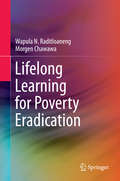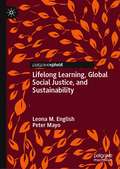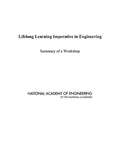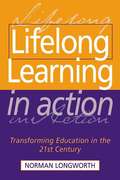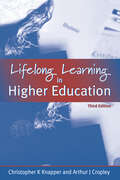- Table View
- List View
Life Under Compulsion
by Anthony EsolenHow do you raise a child who can sit with a good book and read? Who is moved by beauty? Who doesn't have to buy the latest this or that vanity? Who is not bound to the instant urge, wherever it may be found? As a parent, you've probably asked these questions. And now Anthony Esolen provides the answers in this wise new book, the eagerly anticipated follow-up to his acclaimed Ten Ways to Destroy the Imagination of Your Child. Esolen reveals that our children are becoming slaves to compulsions. Some compulsions come from without: government mandates that determine what children are taught, how they are taught, and even what they can eat in school. Others come from within: the itches that must be scratched, the passions by which children (like the rest of us) can be mastered. Common Core, smartphones, video games, sex ed, travel teams, Twitter, politicians, popular music, advertising, a world with more genders than there are flavors of ice cream--these and many other aspects of contemporary life come under Esolen's sweeping gaze in Life Under Compulsion. This elegantly written book restores lost wisdom about education, parenting, literature, music, art, philosophy, and leisure. Esolen shows why the common understanding of freedom--as a permission slip to do as you please--is narrow, misleading, and dangerous. He draws on great thinkers of the Western tradition, from Aristotle and Cicero to Dante and Shakespeare to John Adams and C. S. Lewis, to remind us what human freedom truly means. Life Under Compulsion also restates the importance of concepts so often dismissed today: truth, beauty, goodness, love, faith, and virtue. But above all else, it reminds us of a fundamental truth: that a child is a human being. Countercultural in the best sense of the term, Life Under Compulsion is an indispensable guide for any parent who wants to help a child remove the shackles and enjoy a truly free and full life.
Life Under Compulsion: Ten Ways to Destroy the Humanity of Your Child
by Anthony EsolenWelcome to Life Under Compulsion How do you raise a child who can sit with a good book and read? Who is moved by beauty? Who doesn't have to buy the latest this or that vanity? Who is not bound to the instant urge, wherever it may be found? As a parent, you've probably asked these questions. And now Anthony Esolen provides the answers in this wise new book, the eagerly anticipated follow-up to his acclaimed Ten Ways to Destroy the Imagination of Your Child. Although freedom has become a byword of our age, Esolen reveals that our children are anything but free. In fact, they are becoming slaves to compulsions. Some compulsions come from without: government mandates that determine what children are taught, how they are taught, and even what they can eat in school. Others come from within: the itches that must be scratched, the passions by which children (like the rest of us) can be mastered. Common Core, smartphones, video games, sex ed, travel teams, Twitter, politicians, popular music, advertising, a world with more genders than there are flavors of ice cream—these and many other aspects of contemporary life come under Esolen's sweeping gaze in Life Under Compulsion. This elegantly written book restores lost wisdom about education, parenting, literature, music, art, philosophy, and leisure. Esolen shows why the common understanding of freedom—as a permission slip to do as you please—is narrow, misleading . . . and dangerous. He draws on great thinkers of the Western tradition, from Aristotle and Cicero to Dante and Shakespeare to John Adams and C. S. Lewis, to remind us what human freedom truly means. Life Under Compulsion also restates the importance of concepts so often dismissed today: truth, beauty, goodness, love, faith, and virtue. But above all else, it reminds us of a fundamental truth: that a child is a human being. Countercultural in the best sense of the term, Life Under Compulsion is an indispensable guide for any parent who wants to help a child remove the shackles and enjoy a truly free, and full, life.
Life with Diabetes
by Martha M. FunnellLife With Diabetes is a series of teaching outlines developed and tested by the Michigan Diabetes Research and Training Center, affiliated with the Department of Medical Education of the University of Michigan Medical School. Previous editions of this teaching curriculum have been used by thousands of educators in diabetes clinics throughout North America to help their patients understand and live with the many challenges of diabetes. Each of the 22 topical chapters are detailed guides that give all the information an educator needs to cover a topic completely, yet allows each educator to speak to their patients in his or her own voice at a pace that is appropriate for each individual and class. Each topical chapter includes illustrations that can be used to show and teach important concepts, e.g., carbohydrate counting and how to manage stress, and necessary daily tasks, e.g., monitoring blood glucose and meal planning. There is also an extensive support material section that helps educators manage their educational programs.Life With Diabetes is the one book that every diabetes educator and clinic must have to provide complete and accurate health care to their diabetes patients.
Life with Diabetes
by The Michigan Diabetes Research and Training CenterThe best selling and most relied upon diabetes education curriculum in North America has just gotten better. Life with Diabetes is a sought-after resource that has aided thousands of diabetes professionals as they assist patients in learning the information and skills needed for diabetes self-care. This new edition provides a patient-centered approach that helps you make meaningful and informed choices. Each of the 22 outlines incorporates psychological and behavioral principles for teaching necessary self-care strategies. Each chapter outline includes:Teaching tips, visuals, and handouts for classroom useEvaluation plans and suggested readingsPlus, a full-content, searchable CD-ROMLife With Diabetes, Fourth Edition is concise, tested, and an effective diabetes curriculum.
Life, Work and Learning (Routledge International Studies in the Philosophy of Education)
by Paul Hager David BeckettIn both paid and unpaid work contexts adults learn powerfully from their experiences. In this book, the authors argue that this should be the basis for a new perception of what is truly educational in life. Drawing on the works of Aristotle, Wittgenstein and Russell, along with contemporary conceptual work, they use both philosophical argument and empirical example to establish their view.This work will be of essential interest to philosophers of education and educational theorists worldwide. It will also interest teachers, trainers, facilitators, and all those with an interest in adult and vocational education.
Lifeguard: Passbooks Study Guide (Career Examination Series)
by National Learning CorporationThe Lifeguard Passbook® prepares you for your test by allowing you to take practice exams in the subjects you need to study. It provides hundreds of questions and answers in the areas that will likely be covered on your upcoming exam.
lifelike drawing in colored pencil with Lee Hammond
by Lee HammondFeatures over 40 step-by-step projects using basic techniques and readily available supplies.
Lifelike Drawing With Lee Hammond: Create Lifelike Portraits, Pets, Landscapes And More
by Lee HammondThe queen of drawing instruction shows readers exactly how to make their work more lifelike and realistic. Even complete beginners can get fast results!
Lifelike Heads: Discover Your Inner Artist As You Learn To Draw Portraits In Graphite (Drawing Made Easy)
by Lance RichlinLearn to draw amazingly realistic portraits in seven easy stages—from capturing unique facial features and expressions to different ages and races. This book is the perfect guide for creating lifelike representations of the human head in graphite. Experienced artist Lance Richlin begins by explaining drawing tools and materials, shading techniques, and the important anatomical structures of the head. Following these basics, he shows how to light the subject, block in and render each feature of the face, and address a variety of expressions—from subtle smiles to toothy grins. Then he guides the reader through four impressive projects, showing how to develop a lifelike head drawing in seven simple stages: the lay-in, plumb lines, volume, outline, tonal pattern, value, and finishing. Readers also will find an in-depth troubleshooting section to help them identify and solve any problems that lessen the realism and accuracy of their drawings. In an age full of technological shortcuts, this book emphasizes drawing from life and seeks to preserve the methods of the old masters.
Lifelines: Sound Advice from the Heroes of the Faith
by Mike Pilavachi Andy CroftWhat if, during a battle with fear, we could take some tips from David? Or in wrestling with a relationship, we could learn from Ruth? Or when we’ve got questions about the future, we could sit down with Joseph? Through their successes, struggles, and failures, these men and women of faith have blazed a trail for us to follow. We can walk beside them and discover God with them. Their stories took place thousands of years ago, but what their lives teach us has never mattered more. Much of what we learn comes from the people we live with. We see and share their worlds and, without realizing it, are shaped by them. What would it be like if we could share in the lives of the great heroes of the faith? In Lifelines, Mike Pilavachi and Andy Croft help us understand what the stories of these biblical characters have to teach us about how to live lives full of faith and integrity today.
Lifelong Education and International Relations (Routledge Library Editions: Adult Education)
by Ettore GelpiOriginally published in 1985, this book argues that lifelong education has a vital part to play in fostering international political understanding. It also demonstrates how educational planners can use the concept of lifelong education to deal with some of the contradictions inherent in much of the educational system in the industrialised world. There is a case study from Japan and China and chapters on the role of culture, migration and labour mobility.
Lifelong Engagement in Sport and Physical Activity: Participation and Performance across the Lifespan (ICSSPE Perspectives)
by Margaret Talbot Nicholas L. HoltSport and physical activity should now be understood as lifelong activity, beginning in childhood, and accessible to participants of all levels of ability. This book offers an overview of some of the core concerns underlying lifelong engagement in sport and physical activity, encompassing every age and phase of engagement. The book explores key models of engagement from around the world, as well as specific areas of research that will help the reader understand this important topic. In adopting a lifespan approach, the book pays particular attention to sport and physical activity during childhood and adolescence as well as transitions into adulthood, the developmental periods when participation in sport and physical activity are most likely to decline. Understanding more about participation during these early years is important for sustaining participation during adulthood. The book also addresses issues relating to sport and physical activity during adulthood, across a range of different populations, while a final section examines sport and physical activity among older adults, an often overlooked, but growing segment of society in this context. Lifelong Engagement in Sport and Physical Activity is important reading for undergraduate and postgraduate students in teacher education, sport and coaching science, and for health promoters, coaches, teachers and relevant bodies and organizations in sport and education. This book is published in partnership with ICSSPE, and is part of the Perspectives series
Lifelong Kindergarten: Cultivating Creativity through Projects, Passion, Peers, and Play (The\mit Press Ser.)
by Mitchel ResnickHow lessons from kindergarten can help everyone develop the creative thinking skills needed to thrive in today's society.In kindergartens these days, children spend more time with math worksheets and phonics flashcards than building blocks and finger paint. Kindergarten is becoming more like the rest of school. In Lifelong Kindergarten, learning expert Mitchel Resnick argues for exactly the opposite: the rest of school (even the rest of life) should be more like kindergarten. To thrive in today's fast-changing world, people of all ages must learn to think and act creatively—and the best way to do that is by focusing more on imagining, creating, playing, sharing, and reflecting, just as children do in traditional kindergartens.Drawing on experiences from more than thirty years at MIT's Media Lab, Resnick discusses new technologies and strategies for engaging young people in creative learning experiences. He tells stories of how children are programming their own games, stories, and inventions (for example, a diary security system, created by a twelve-year-old girl), and collaborating through remixing, crowdsourcing, and large-scale group projects (such as a Halloween-themed game called Night at Dreary Castle, produced by more than twenty kids scattered around the world). By providing young people with opportunities to work on projects, based on their passions, in collaboration with peers, in a playful spirit, we can help them prepare for a world where creative thinking is more important than ever before.
Lifelong Leadership by Design: How to Do More Good for Kids and Feel Better About Your Life's Work
by Robert D. RamseyOffering practical advice for education leaders at all levels, this essential guide helps readers build a dynamic career by design—not by default—and leave a lasting legacy.
Lifelong Learning: Concepts and Contexts
by Jim Crowther Peter SutherlandLifelong learning has developed enormously as a distinct area of study within education in recent years not least because numerous governments and educational strategists have become very vocal supporters of new ways of learning throughout all stages of life. This guide to the topic brings together new writing from some of the leading thinkers in the field to offer a broad ranging and detailed snapshot of the position to date. The book provides a critical summary of current developments in understanding adult learning and the social context in which they are located. This provides a background for the framing of issues and the problems that emerge in institutional and non-formal contexts of lifelong learning. Students undertaking courses of study in this area as well as a wide range of undergraduate and postgraduate students in a variety of professional areas will find the material essential reading.
Lifelong Learning: Transforming Education In The 21st Century
by Davies, W. Keith Longworth, NormanThis text sets out to explain the issues and attributes of lifelong learning as well as outlining the many initiatives which are being taken to help understand the implications and new roles for many of our institutions.
Lifelong Learning: Education Across the Lifespan
by Mal Leicester John Field'Lifelong Learning' is a hot issue for educators across the world, as societies everywhere are concerned with developing a literate, skilled and flexible workforce and to widen participation in education at all levels and for all age-groups. This book covers all the major issues, with well-known academic contributors working in the field and covering the topics of theoretical, global and curriculum perspectives, widening participation and the industrial university.Topics covered include:* Community education* Popular education* Higher education* The corporate university* The school curriculum* Vocational studies.With contributors from China, Africa, USA, Canada, UK and other European countries, Lifelong Learning offers a comprehensive and challenging account of issues arising from varying lifelong learning decisions, and exposes the impact these decisions have on such a large majority of the population.
Lifelong Learning and Dementia: A Posthumanist Perspective (Palgrave Studies in Adult Education and Lifelong Learning)
by Jocey Quinn Claudia BlandonThis book explores the potential for lifelong learning in dementia. A growing social issue, dementia has previously been understood as a wasteland for learning: at best, those with dementia are helped to hold on to some pre-existing skills. This book draws on extensive qualitative data with people with dementia and their families to demonstrate that new forms of learning can happen in dementia, with positive outcomes for both the learner and those around them. In doing so, this book demonstrates that those with dementia help us to understand learning differently, thus providing a breakthrough in our understanding and theorising of lifelong learning. Using posthuman theory to scaffold and discuss the findings, this pioneering book will appeal to scholars of dementia, lifelong learning and the posthuman.
Lifelong Learning and the University: A Post-Dearing Agenda
by Richard Taylor David WatsonThe Report of the National Committee of Inquiry into Higher Education chaired by Sir Ron Dearing was published in July 1997. It represents the first officially sponsored systematic examination of the United Kingdom's system of higher education since the Robbins Report over 25 years ago. This book is an authoritative evaluation of the cogency, relevance and prospects for success of the Dearing vision and recommendations. Like the members of the comittee, the authors have sought to take a holistic view; to consider the underlying implications of genuine lifelong learning for the university system, and how institutions and the system will need to adjust. The outcomes are threefold: a description of what a UK higher education system that is genuinely part of a national learning society might look like, as well as the impetus this provides for radical reform; identification of features of its historical (especially recent) development, as well as wider social forces, which might inhibit or encourage its performance in this way; and an assessment of the coherence, desirability and practicality of the Dearing proposals in bringing about this end.
Lifelong Learning for Poverty Eradication
by Wapula N. Raditloaneng Morgen ChawawaThis book illustrates the meaning and scope of lifelong learning and different types of poverty reduction programs prevalent generally in the African context and particularly in selected communities in Botswana. Lifelong learning is important for all stakeholders in poverty reduction to develop a better understanding of the scope and extent of poverty so that they can make informed decisions on best ways of tackling poverty. The book succinctly showcases community development and engagement initiatives and experiences from selected African universities and how the interaction of the universities and their respective communities resulted in a major transformation in the lives of poor families through exposure to some engagement strategies that effectively gave them a better future in their fight against poverty. This book develops in the reader a better understanding of the dynamics and dilemma of poverty and its negative effects on individuals and communities. But it answers the plight of the poor by equipping them with effective and practical tools to transform their lives and take full control of their destiny. · Provides a conceptual understanding of lifelong learning · Describes practical aspects and indicators of poverty and how it requires tackling through a multi-sectoral approach · Focuses on poverty reduction in all fronts, including development of an entrepreneurship mind-set
Lifelong Learning, Global Social Justice, and Sustainability
by Leona M. English Peter MayoThis book examines lifelong learning from different angles and follows the trajectory beginning with the expansive notion of lifelong education promoted by the United Nations Educational, Scientific, and Cultural Organization (UNESCO) and its subsequent version intended to better suit the neoliberal framework and make EU countries more competitive in the global economy. The authors critique this version of lifelong learning by contrasting it with the notion of critical literacy. They also devote attention to the UN’s advocacy concerning lifelong education and sustainable development, arguing that for lifelong learning to help realize this goal, it needs to become more holistic in scope and engage more globally conceived social and human-earth relations. The book concludes with a discussion on lifelong learning and the COVID-19 pandemic.
Lifelong Learning Imperative in Engineering: Summary of a Workshop
by National Academy of Enegineering National of the National AcademiesThe 21st century is witnessing a rapid increase in the pace of knowledge creation in the sciences and engineering. Competing in this global economy requires a science and engineering workforce that is consistently at the technological forefront. Dr. Charles Vest, President of the National Academy of Engineering, in a speech at the University of Michigan on October 15, 2007, put it simply: prospering in the knowledge age requires people with knowledge. The purpose of the Lifelong Learning Imperative Workshop, summarized in this volume, was to consider learning opportunities for the engineering professional. The participants in the workshop addressed the necessity of lifelong learning, the history of continuing education, possible delivery systems, systems used by other professions, and the current state of learning when viewed in the light of the rapid rate of technological change.
Lifelong Learning in Action: Transforming Education in the 21st Century
by Norman LongworthSince the concept of lifelong learning came to prominence much excellent work has been undertaken but, as Professor Longworth's new book shows, major change in some areas is still needed if the concept of learning from cradle to grave is to become a true reality. Using his unique vantage point from consulting with schools, universities, local, governmental and global authorities, Professor Longworth brings the development of lifelong learning bang up-to-date with a complete survey of the principles of lifelong learning including examples from around the world and crucial information on the impact of lifelong learning on 21st century schools.
Lifelong Learning in Higher Education
by A Cropley Chris KnapperThis text examines how colleges and universities might respond to the increasing need for people to take responsibility for their own education and to remain motivated. It devotes attention to teaching methods, organizational structures and the goals of higher education.
